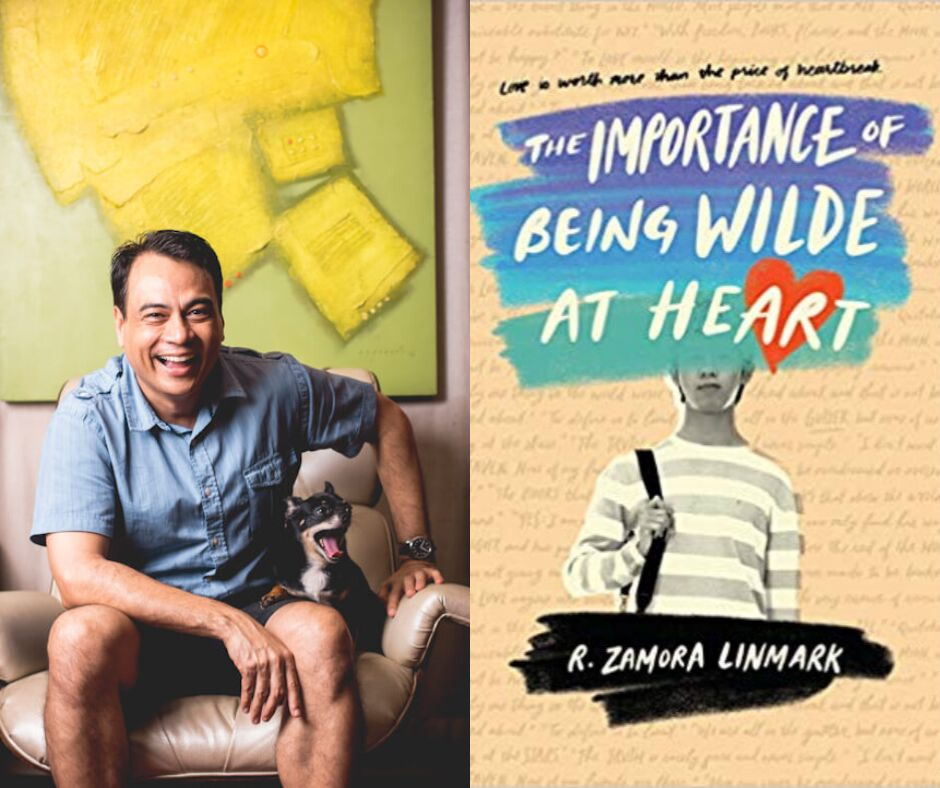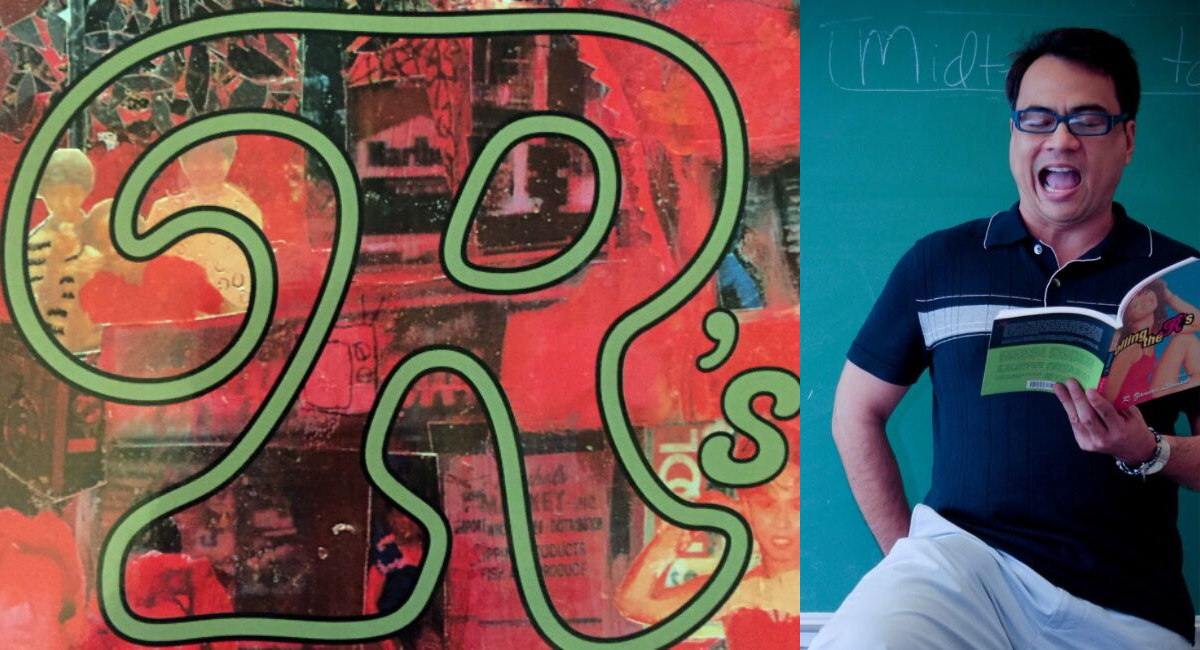Patrick Raneses, Kundiman's Spring/Summer 2019 Communications Intern, interviewed R. Zamora Linmark about his latest book The Importance of Being Wilde at Heart, which was just published on August 13th, 2019. Order his book here.
Elaine Castillo, in her forward to Bulosan’s America is in the Heart, briefly discusses the revelatory experience of a young reader seeing characters in a book “that looked and lived like you in it.” I know that you have delved into the coming-of-age narrative with your seminal debut novel, Rolling of the R’s. Why was it important for you to write The Importance of Being Wilde at Heart specifically within the framework of the Young Adult genre? To rephrase the question, why was it important to you to write specifically to teenagers?
This book project first came to me in the fall of 2010, when a series of teen suicides occurred just days apart from each other. September, to be exact. Racially different, these teens had one commonality: they were victims of bullying. Rejected, beaten, and taunted because they were different, yet, in the eyes of hatred, dared to be themselves. One of the four who died that week was openly gay. I was enraged, yet in awe of their guts. My heart broke. I felt hopeless, was helpless; I wanted to punch the world in the face. It brought me back to the time when I was growing up in the 80s and the AIDS virus was killing thousands of people, and teens, like myself, who knew they were gay were terrified to come out because of the stigma it bore, and because we thought we were next in the toe tag line. We were anxious, guilt-ridden, pissed off at ourselves and at the government, but we couldn’t do anything because the virus was so powerful it left no clues for doctors to decipher. And it didn’t help either that the Centers for Disease Control was not getting the funding it needed for research because the U.S. was under the Reagan administration that was infested with homophobes. The circumstances may have changed, but the output remained the same. I knew right there and then that the only way to deal with the rage and madness, hatred and sadness, was to write about it, and that it would be a novel targeted for young adult readers. I had never written a YA before nor with a specific audience in mind, so this was one of the challenges, which I welcomed; in fact, I do not dive into novel writing if there’s no challenge. This novel I knew from the start would address such issues as bullying, with characters who dare to be themselves in a society ridden with hatred, homophobia, and violence. Thus is how the characters of Ken Z, the trans CaZZ, and the androgynous Estelle were borne. Individual-driven, marginalized, non-conformists, meaning, anti-belonging. They would form their own community, one where they could be themselves and did not need the approval of the majority because, to them, belonging is not defined by numbers but that shared space where they can thrive as individuals, voice their differences despite commonalities, and continue to encourage and strengthen each other. This, to me, is the only way to combat hatred and violence. Otherwise, there will be minimal room for empowerment to happen.
Rolling of the R’s (1997)
Your commitment to writing about young outcasts—whether queer, Asian Pacific American, quiet literary-types, or in the case of Ken Z, an interweaving of all of those identities—is ubiquitous in this novel. Oscar Wilde plays an essential role, appearing as a sort of Virgilian guide to the protagonist in his struggle to navigate his first love and serving an ideal for him to follow in terms of embracing his own identity as an outsider. Who are some inspiring literary outcasts that have informed your own writing, and in what ways?
In my three novels, there is a Virgilian character/s. In Rolling The R’s, it is the trans Exotica. In Leche, there are several Virgil-like characters who serve as Vince’s guide into his personal hell, from Dante, the cab driver, to his grandfather who comes to life in the form of memories. In my latest, The Importance of Being Wilde at Heart, it is Oscar Wilde, brilliant, yet flawed. As a writer from the margins, I tend to gravitate to writers who were/are literary outcasts themselves, if not for their gender and/or race, then for their rebellion against literary conventions. Early influences were predominantly from the canon (I majored in Literature, both undergrad and grad): Milton, Dante, the Renaissance poet John Skelton, Jonathan Swift. Then my mentor Faye Kicknosway introduced me to the writings of Jessica Hagedorn who, at the time, had just published Dogeaters. To read a book about the Philippines with Filipino characters that were so spot on, and authored by a Filipina, was mind-blowing and inspiring on so many levels. Hagedorn’s books made me want to become a writer even more, not only because we shared a common origin, but because she was stylish and daring in her narratives, both content and structure. Like writers Mañuel Puig and Karen Tei Yamashita whose I-Hotel leaves me in awe until today. These writers, for me, I turn to for inspiration again and again, for they redefine, and show the limitless possibilities of, the novel genre.
Love in The Importance of Being Wilde at Heart takes on several manifestations: most prominent narratively, the brief but passionate relationship of Ken Z and Ran, but also embodied between the protagonist and his friends, his mother, his homeland, and for his literary idols. Throughout the novel, Ken Z creates lists that underline and elevate the seemingly diminutive objects/moments/ideas in his life by culling those little things together and, by virtue of their alignment, transforming those things into poetry. What’s a brief list of things—small, unexpected, forgotten—you’re in love with right now?
I’m glad you brought up the different types of love in this novel b/c, aside from Ken Z’s romance with Ran, I also wanted to explore the love between friends, the unspoken love between Ken Z and his mom, love for the homeland despite its shortcomings, and the love Ken Z develops for his role model, Oscar Wilde; how these manifestations, with their difficulties and rewards, serve as a fuel for Ken’s creative output—his lists, haikus, random musings. Right now, if I were to make a list of “small, unexpected, forgotten” things I’m in love with, they are:
Sun salutations.
Bubble tea in sweltering Taipei.
Revisiting The Catcher in the Rye on the same day that my friend Marx told me it had just turned sixty eight.
Crunching on chicharon and praying my heart to stay still.
Seeing Gina again and toasting to Insurrecto with a bottle of Mondavi.
Rain plopping on tin roof.
The current book project that sprang up out of nowhere three weeks ago and has since invaded my life.
Italian dinner with RD and Allan during Saturday’s storm.
Morning hiking trail.
The mountain beside me.




